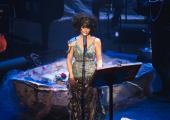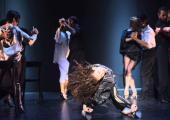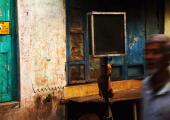Old, young, or somewhere in the middle - people of all ages fill the seats around me and noisily wait for the evening to begin. The Picador Poetry List - home to literary giants like Carol Ann Duffy and Clive James - is celebrating its 20th birthday in the grandeur of Brighton’s Theatre Royal with performances from five of its most exciting contemporary poets: Hollie McNish, Glyn Maxwell, Lorraine Mariner, Richard Osmond, and Kate Tempest. After head of Picador Poetry, Don Paterson, warms up the crowd with an introduction that borders on stand-up comedy, the lights dim and Hollie McNish (pictured below) takes to the stage.
Warm, personable, chatty, and humorous - McNish has the crowd in the palm of her hand from the moment she admits her poems are ‘mostly about getting fingered’. Reading from her debut Picador collection Plum, McNish’s stanzas of adolescent experimentation and outrageously frank confessions are peppered with moments of sheer genius: whilst “Wanking”’s “apparently up and down did not mean like a lever” has the audience in fits of giggles, the rawer “Because That’s What You Do” (which explores the tragic reason a friend of McNish’s got married) leaves the audience stunned and disarmed. McNish exits the stage to wild applause.
Twenty years after the Picador Poetry list began, its roster seems stronger than ever
Glyn Maxwell then walks on and, rather austerely, launches straight into his first poem. The audience seems slightly unsure what to make of him, until he subsequently starts up a steady stream of political quips and jokes, and both poet and crowd relax into their roles. Wry and winding, his poems are subtler than his predecessor’s but equally as enjoyable, especially his cathartic final piece exploring an acquaintance’s descent into extreme paranoia. Maxwell, too, leaves the stage to the fullest audience clapping.
Finishing the first half is Lorraine Mariner, a deceptively upbeat and chirpy woman whose poems explore “everyman” fantasies, and the slivers of humanity seen in day-to-day life; she gets the biggest laugh of the evening in her understated opening poem about breaking up with her invisible boyfriend, Stanley. Turning to social media halfway through her set, her poem “Fortune” is a witty cross-examination of her Facebook friends list, culminating in a profound condemnation of Facebook as a “strutting peacock, pecking at my heels”.
After the interval, Richard Osmond reads from his first collection of poetry, Useful Verses, the standout poem from which is “Luck and Colour”, in which the narrator meets a leprechaun and describes him from the point of view of a botanist, a coder, and a teenager. Interspersed between his “normal” poems are the eponymous “useful verses” – cures for lunacy, spots, and snake bites translated from olde English. Wickedly self-aware, his pastiches of superstition and non-verbal utterances leave the audience amused and impressed.
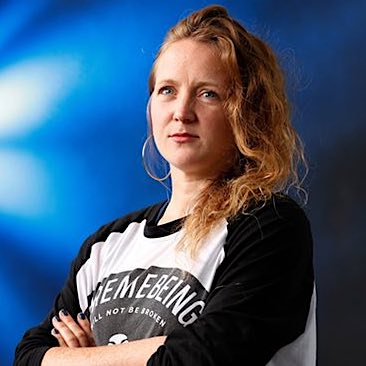 Finally, it’s Brighton Festival curator Kate Tempest’s turn to talk. Rejecting the microphone in the centre of the stage, Tempest wanders around the stage, melting poems from her three published works Hold Your Own, Brand New Ancients, and Let Them Eat Chaos into one epic narrative. Lilting between fury and ecstasy, there’s something ageless and infinitely wise about Tempest - through her characters, she shows us “tenderness, jealousy, curses and gifts”. Despite having started her set with the observation that “bored shitless and deeply moved sound exactly the same” from an audience, the subdued audience are most definitely in the latter category - by the time she finishes and marches off, the enraptured audience are shouting for more.
Finally, it’s Brighton Festival curator Kate Tempest’s turn to talk. Rejecting the microphone in the centre of the stage, Tempest wanders around the stage, melting poems from her three published works Hold Your Own, Brand New Ancients, and Let Them Eat Chaos into one epic narrative. Lilting between fury and ecstasy, there’s something ageless and infinitely wise about Tempest - through her characters, she shows us “tenderness, jealousy, curses and gifts”. Despite having started her set with the observation that “bored shitless and deeply moved sound exactly the same” from an audience, the subdued audience are most definitely in the latter category - by the time she finishes and marches off, the enraptured audience are shouting for more.
20 years after the Picador Poetry list began, its roster seems stronger than ever with these five at the helm. Unique, witty, and engaging; the evening sums up everything poetry should be...
Overleaf: Watch the video for the poem "Embarrassed" by Hollie McNish


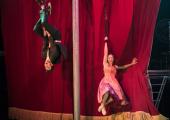

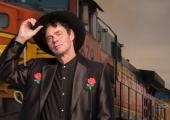


 Finally, it’s Brighton Festival curator Kate Tempest’s turn to talk. Rejecting the microphone in the centre of the stage, Tempest wanders around the stage, melting poems from her three published works Hold Your Own, Brand New Ancients, and Let Them Eat Chaos into one epic narrative. Lilting between fury and ecstasy, there’s something ageless and infinitely wise about Tempest - through her characters, she shows us “tenderness, jealousy, curses and gifts”. Despite having started her set with the observation that “bored shitless and deeply moved sound exactly the same” from an audience, the subdued audience are most definitely in the latter category - by the time she finishes and marches off, the enraptured audience are shouting for more.
Finally, it’s Brighton Festival curator Kate Tempest’s turn to talk. Rejecting the microphone in the centre of the stage, Tempest wanders around the stage, melting poems from her three published works Hold Your Own, Brand New Ancients, and Let Them Eat Chaos into one epic narrative. Lilting between fury and ecstasy, there’s something ageless and infinitely wise about Tempest - through her characters, she shows us “tenderness, jealousy, curses and gifts”. Despite having started her set with the observation that “bored shitless and deeply moved sound exactly the same” from an audience, the subdued audience are most definitely in the latter category - by the time she finishes and marches off, the enraptured audience are shouting for more.